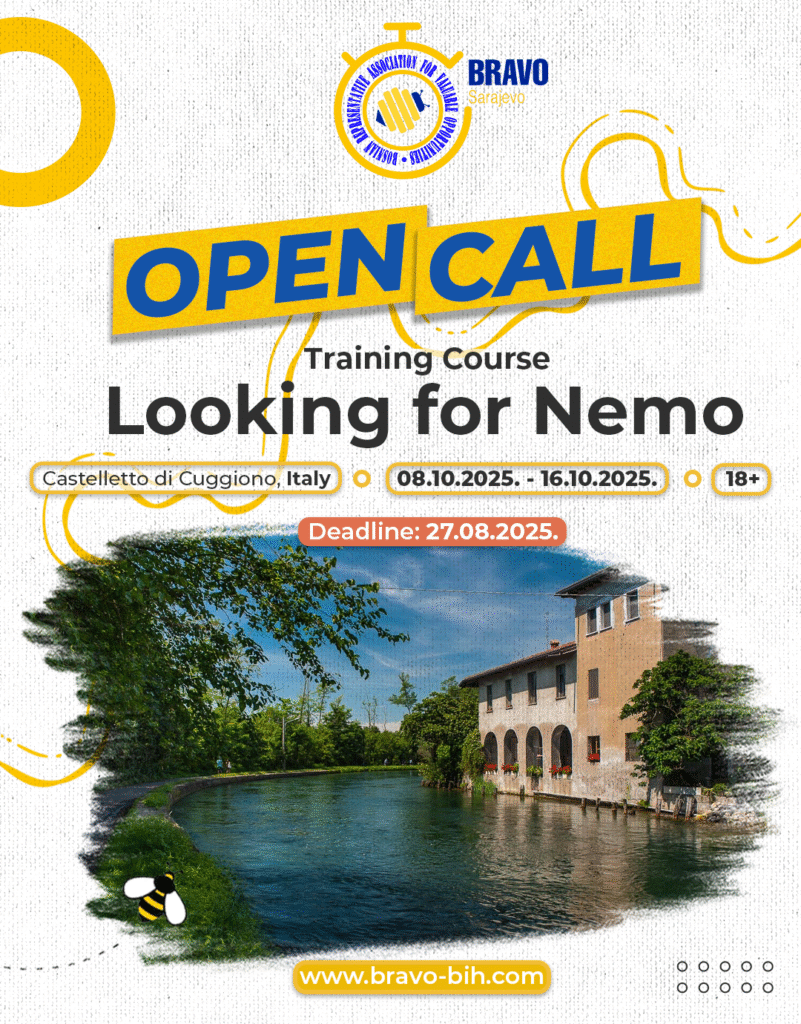
- Name of the project: Training Course “Looking for Nemo“
- Dates of Project: 08.10.2025. – 16.10.2025.
- Sending organization: “BRAVO”
- Hosting organization: “Young Effect Association”
- Places: Castelletto di Cuggiono, Italy
- Participants age: 18+
- The number of participants: 3
- Working language: English
- Deadline for applying: 27.08.2025
This project is supported and co-funded by the Erasmus+ program. It means that your travel costs, accommodation, and food will be fully covered if you get selected for the project. The European Commission’s support for the production of this publication does not constitute an endorsement of the contents, which reflect the views only of the authors, and the Commission nor EACEA can be held responsible for any use which may be made of the information contained therein.
ABOUT THE PROJECT
This Erasmus+ training course that addresses the growing challenge of youth exclusion and its link to vulnerability to extremist ideologies. In a context where many young people feel disconnected from society and are drawn to radical narratives, the project focuses on empowering youth workers with inclusive tools and methods. Through non-formal education, participants will explore creative and practical approaches to foster belonging, dialogue, and active participation. The training will also promote the exchange of good practices and support the creation of safe spaces for marginalized youth. Inclusion is not a concept, it’s a method, a mindset, and a daily practice.
This Erasmus+ training course aims to:
– Equip youth workers with inclusive non-formal education methods to foster a sense of belonging, identity, and positive self-expression among young people at risk of social exclusion and extremism.
– Develop participants’ ability to recognize early signs of marginalization and social vulnerability that can lead to radicalization, through participatory observation and trust-based relationships.
– Introduce and practice creative inclusion tools that can be adapted and implemented in local youth work to reduce feelings of alienation and frustration.
– Foster intercultural competence and empathy-building approaches, enabling youth workers to promote diversity and peaceful
coexistence in multicultural contexts.
– Strengthen youth workers’ facilitation and communication skills to mediate in tense or conflictual group dynamics, and to create safe spaces for expression, listening, and critical thinking.
– Promote peer learning and cooperation among youth workers from different countries by sharing good practices, case studies, and
community-based strategies for inclusive youth engagement.
– Encourage the design of follow-up initiatives under Erasmus+, focused on the inclusion and empowerment of vulnerable youth,
using the tools and methods developed during the training.
PARTICIPANT PROFILE
– Age: 18+
– Participants must be able to communicate in English.
– Young people who are interested in the topic of social inclusion.
– Active participation (It is an educational training course with everyday sessions and activities, but of course with enough fun during the project).
– The age of the participants should be from +18 years old but because of the location (hostel) we invite to target youth workers who are strongly adaptable to youth life.
– Gender balance is a must.
ACCOMMODATION, FOOD & TRAVEL
- Venue: La Scala di Giacobbe
- Participants will stay in multiple rooms 3-4 beds. Each room, has its own bathroom. –
- No single rooms are available.
- Breakfast, lunch and dinner will be served in the guest house and are prepared by our volunteers.
- Guest house facilities: bed-linen and towel.
- Automatic laundry shop is located nearby.
- Traditional Italian food will be prepared by our volunteers and will be the same for all the participants. Therefore we cannot
guarantee specific dietary differentiation with the exception of vegetarian food and not pork. - Travel expenses will be refunded
TRAVEL AND COST LIMITS:
Bosnia and Herzegovina – Fully Covered
How to apply?
- Complete the BRAVO- APPLICATION FORM in English until 23:59 on deadline day.
- Deadline for applying: 27.08.2025.
- PARTICIPATION FEE: NO PARTICIPATION FEE
- If you have any questions don’t hesitate to contact us at: office@bravo-bih.com
- THE USE OF AI IN THE APPLICATION FORM IS FORBIDDEN
